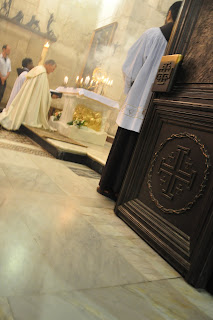At the time, I took the picture only thinking it was an interesting commemoration of a specific event. Little did I know that a couple months later, I would see the reconstructed menorah.
The menorah is valued at $3 million. The core is metal, but the whole thing is plated in gold.
Honestly, I don’t think I’ve ever been to a city before that has had so many children.
There was a Bar Mitzvah or some other sort of celebration going on by the Temple walls.
My beautiful roommates
As part of our New Testament study of Jerusalem, we visited the remains of the Temple Walls from the Herodian period. To clarify, the Temple of Solomon has gone through multiple reconstructions. The First Temple Period is the time of Solomon’s original temple. The Second Temple Period is when Ezra and Nehemiah rebuilt the wall after the Babylonian Exile. Finally, Herod expanded the city limits by building around the already existing walls, and then tearing down the parts of the old wall he wasn’t using. He also rebuilt the temple. Some people call this the Third Temple Period. Others consider it still as part of the Second Temple Period because Herod didn’t build a new wall; he only renovated it.
Tim, standing on top of Robinson’s Arch, part of the Temple remains
Tributes to YMCA…
…and JUC! (Jerusalem University College—where we’re studying) =D
This is for my tree-hugging best friend, Tricia. (Lubja, dork!)
Inside a Byzantine home
Sitting on the original steps in front of the southern wall of the Temple
These were almost baptismal like structures underground that worshippers would bathe in before entering the Temple.
An Arabic stained class window in the Upper Room. There really wasn’t much in the Upper Room. However, we did share a powerful moment, singing a song of praise in the reverberating acoustics of the domed room.
After returning to the classroom for some more geography lessons for the afternoon, we ventured out again in the evening to the Church of the Holy Sepulchre. Aubrey warned us that the interior decorations were gaudy and probably not the most attractive. However, I was pleasantly surprised. I’m not usually a fan of Byzantine architecture and design, but this was actually quite beautiful. At the same time, the ritualism and faith in inanimate objects saddened me. Here they were, standing on the site of Christ’s crucifixion, and instead of being able to celebrate his resurrection, the provision of salvation, and our subsequent personal relationship with him, they could only perform their rituals and hope to be blessed by touching certain sacred objects.
Almost Celtic-like windows
Pilgrims wiping and praying over the stone on which Christ was supposedly laid when they took him off the cross
Armenian monks lighting candles and incense
Prayers and incantations
I was lucky enough to stand right behind a monastic procession. Gregorian chants really are beautiful, especially with good acoustics.
Mass--the smell of incense was so, so strong! You can even see the smoke in the picture up around the altar. (It was interesting, also, to see the various sects shuffle in and take turns. They just share the space in shifts…Roman Catholics, Greek Orthodox, Armenians, Coptics, etc.)
So ends our day in New Testament Jerusalem. From here on out, we're all over Israel, spending at least 10 hours in the field on most days. As always, lots of pictures and posts to come! (Hopefully, I can keep up as well as any of you can...)





















No comments:
Post a Comment